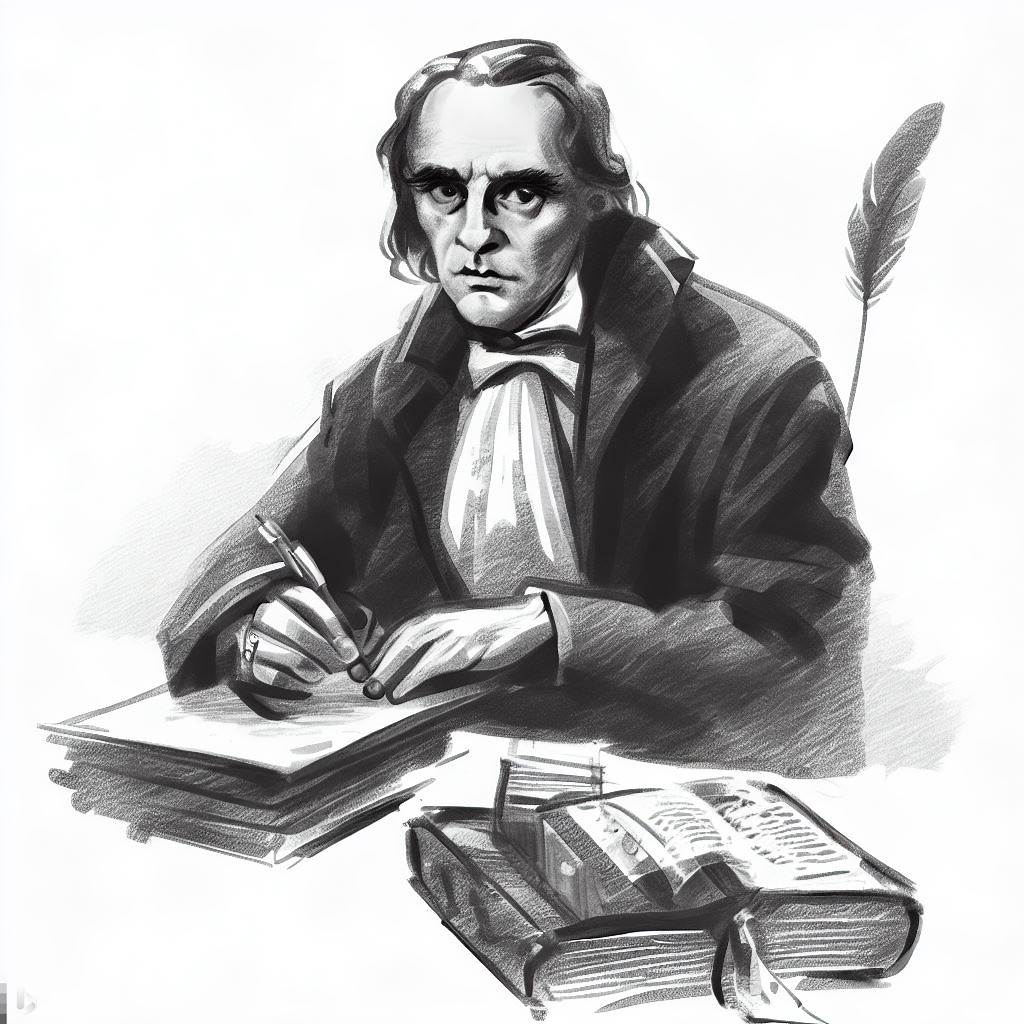Henry Fielding, an 18th-century English novelist, stands as a remarkable figure in the history of English literature. His contributions to the novel genre and his great work “Tom Jones” have left a potential mark on literary history.
In this blog post, we will explore the life, works, and impact of Henry Fielding, shedding light on his novels and his role in forming the novel’s story as we know it today.
Henry Fielding as “The Father of the English Novel”
Henry Fielding was an English writer and judge who is one of the founders of the English novel. His most famous novel, Tom Jones, is a masterpiece that has appeared in various movies and television shows.
Fielding was born in 1707 at Sharpham Park, Somerset, England. He was the eldest son of Edmund Fielding, a Colonel in the British Army, and Sarah Gould, a magistrate’s daughter. Fielding was educated at Eton College, where she studied classical literature, languages, and many other subjects.
Early Life and Education
Henry Fielding was born into a family that is also known for its literary heritage. His paternal grandfather was one of the great playwrights, while his maternal grandmother was also a writer. This literary lineage influenced young Henry’s upbringing and fostered his love for the arts. He went to Eton College, where he polished his writing skills and got an appreciation for classical literature. Fielding’s educational journey would later play a role in shaping his critical perspectives on justice and the legal system, evident in his works.
Henry Fielding: A Literary Pioneer
His cause of fame is the novel “Tom Jones,” which remains a classic in English literature. Fielding’s life and career were marked by his contributions to this novel as a distinguished literary form, his comedic and satirical works, and his interest in societal issues of his time.
In the vibrant tapestry of 18th-century England, amidst political issues and societal transformations, Henry Fielding appeared as a luminous person whose literary contributions would reverberate through the centuries. Beyond the captivating narratives and witty dialogues that adorn his novels, Fielding’s life and works were embedded in the intricate web of history, culture, and human nature.
Theater and Early Literary Ventures
Fielding’s literary journey began in the realm of theater. His comedic talent and keen wit were evident in his plays. “Love in Several Masques” (1728), his debut play, showcased his knack for humor and satire. Subsequent plays like “The Temple Beau” (1730) and “Rape upon Rape” (1730) established Fielding as a playwright with a distinctive voice.
However, his most notable work in the realm of theater was “The Historical Register for the Year 1736” (1737), a satirical play that critiqued the political and social landscape of England. Through this work, Fielding showcased his inclination toward using comedy as a tool for commentary.
Novels and Narrative Innovation
Fielding’s transition from theater to novel writing marked a significant shift in his career. In 1741, he published “Joseph Andrews,” a novel that parodied Samuel Richardson’s “Pamela.” While “Pamela” depicted a virtuous servant girl resisting the advances of her master, Fielding’s “Joseph Andrews” followed the escapades of Pamela’s brother. This novel introduced readers to Fielding’s narrative style, characterized by humor, irony, and a satirical examination of social norms.
However, it was “The History of Tom Jones, a Foundling” (1749) that catapulted Fielding to literary stardom. The novel chronicled the adventurous life of Tom Jones, employing a picaresque narrative structure. Beyond its comedic elements, the novel delved into themes of morality, virtue, and human nature. Fielding’s astute observations of society’s complexities were interwoven with intricate character development and a sprawling plot.
Henry Fielding’s Famous Novels
Henry Fielding was a prolific writer, authoring a range of works including novels, plays, essays, and pamphlets. His works are consistently cherished by readers and studied by scholars.
Henry Fielding was a prolific writer who created a lot of work, including novels, plays, essays, and pamphlets. His work is still enjoyed by readers today, and it continues to be studied by scholars.
The most famous works of Henry Fielding
Tom Jones (1749), Fielding’s masterpiece
Fielding’s masterpiece is the novel “Tom Jones”. It tells the story of a young man who was born into poverty but eventually finds success and happiness. Tom Jones is considered one of the greatest literary novels and Henry’s greatest work. Fielding uses Tom Jones to explore a variety of topics, including the nature of good and evil, the importance of virtue, and society’s role in shaping our lives.
Shamela (1741)
Shamela is a satirical novel that is a parody of Samuel Richardson’s Pamela. Pamela is a novel about a young woman who is trapped into marrying a rich man. In Shamela, Fielding turns the tables on Richardson and tells the story from the perspective of Pamela’s servant, Shamela. Shamela is a cunning and manipulative young woman who is determined to marry her master, regardless of his wealth or social status.
Joseph Andrews (1742)
Joseph Andrews is a novel that is a continuation of Shamela. It tells us the story of Joseph Andrews, the brother of Pamela. Joseph is a virtuous young man who is being tested by the evil world around him. In Joseph Andrews, Fielding explains the theme of virtue in a universe that is often hostile to it. He shows how Joseph’s virtue is tested by his encounters and enemies with a variety of characters, including prostitutes, thieves, and corrupt magistrates.
Amelia (1751)
Amelia is a more serious work than Fielding’s earlier novels. It tells the story of a young woman married to a gambler and a drunkard. Amelia is a revolving story about the challenges of marriage and the significance of love and compassion.
The History of Jonathan Wild the Great (1743)
The History of Jonathan Wild the Great is a satire of the criminal underworld. It tells the story of Jonathan Wild, a thief who becomes a famous criminal mastermind. Fielding uses Jonathan Wild to explore the theme of hypocrisy.
This shows how Wild can rise to power by posing as a respected citizen while also being the secret mastermind of forensics. Except for these novels, Fielding also wrote various plays, essays, and pamphlets. He was also a political activist and frequently criticized the government of the time in his writings.
Fielding’s Literary Style
Henry Fielding’s literary style had a major influence on the development of the English novel. He helped establish genre conventions such as the use of satire, humor, and realism. His work also had a lasting influence on later writers such as Jane Austen, Charles Dickens, and George Eliot.
Key Elements
Satire: Fielding was a master of satire and often used his novels to poke fun at the social and political conventions of his day.
Humor:
Fielding’s novels are filled with humor, and he had a flair for creating memorable characters and witty dialogue.
Realism
Fielding’s novels are rooted in reality, and he often uses his own experience as a judge to create his characters and plots. Moral Purpose: Fielding’s novels often had a moral purpose, and he used his work to explore the nature of good and evil, the importance of virtue, and the role of society in shaping our lives.
Authorial intrusion
Fielding often broke the fourth wall and addressed the reader directly in his novels. In this way, he could comment on the plot of the story and share his thoughts and opinions.
Digressions
Fielding was also known for using digressions, long passages that are not essential to the plot of the story. These digressions often served as social criticism or the discussion of philosophical ideas.
Character development
Fielding’s characters are complex and well-developed. He often used his novels to explore the nature of good and evil and how people can change and grow over time. Plot Structure: Fielding’s novels often have a complex plot structure with many subplots and twists. It helped keep the reader engaged and guessing what was going to happen next. Fielding’s literary style had a major impact on the development of the English novel. He helped establish genre conventions such as the use of satire, humor, and realism. His work also had a lasting influence on later writers such as Jane Austen, Charles Dickens, and George Eliot.
Fielding’s literary devices and techniques in the novels
Characters
Fielding’s characters are complex and well-developed. They’re not just the best or the worst, they’re often a mix of both. This makes them more realistic and accessible to the reader.
Storyline
Fielding’s storyline is often complex and twisted. This leaves the reader guessing what will happen next.
Settings
Terrain settings are often realistic and detailed. This helps create a sense of immersion for the reader.
Themes
Fielding’s novels cover a wide variety of themes, including the nature of good and evil, the importance of virtue, the role of society in shaping our lives, and the power of love.
Style
Fielding’s style is witty and humorous, often using satire in social commentary. He also uses ramblings to comment on social issues or explore philosophical ideas.
Influence
Fielding’s works had a lasting impact on the development of the English novel. He is considered one of the originators of the genre, and his work has been imitated by many other writers.
Fielding’s works are always relevant because they address universal issues that are always relevant in our lives. Filled with wisdom and insight, his novels continue to entertain and enlighten readers of all ages. Henry Fielding was a true master of the novel, and his work continues to entertain and enlighten readers today. Filled with wit, humor, and wisdom, his novels explore a wide range of human emotions and experiences. Fielding was also a social critic and his novels often challenged the status quo. He was a man of great kindness and gentleness, and his work had a lasting influence on the development of the English novel. I encourage you to read his novels or learn more about his life and work.
Henry Fielding’s famous quotes are
- “All nature is a comedy to the thinker, a tragedy to the feeling.”
- “A wise man is one who learns from his mistakes, but a wiser man is one who learns from the mistakes of others.”
- “The only thing necessary for evil to triumph is that good people do nothing.”
- “We should never judge the heart by sight and the senses by sound.”
- “Wisdom is not the result of learning, but of a lifetime of effort to acquire it.”
- “Man cannot perfectly be happy in this world, but it can be perfectly comfortable
- “The only constant in life is change.”
- “The world is a comedy to the thinker, a tragedy to the feeling.”
- These are just a few of the many quotes from Henry Fielding that can be quoted. His works are filled with wisdom and insight, and his words still resonate with readers today.
Legacy and Influence
Henry Fielding’s impact on the novel genre cannot be overstated. His emphasis on character development, social critique, and narrative structure laid the foundation for subsequent novelists. Authors like Charles Dickens and Jane Austen were influenced by his work and carried forward his legacy of social observation and storytelling.
Fielding’s literary influence extended beyond novels and plays. He was involved in editing and contributing to periodicals such as “The Champion” and “The Covent-Garden Journal.” Through these platforms, he engaged with diverse topics, including literature, morality, and society.
Fielding’s writings demonstrate his satirical flair, astute analysis of contemporary issues, and engagement in intellectual discourse.
Henry Fielding is considered one of the most important figures in the history of English literature. His work continues to be widely read and studied and continues to influence writers and thinkers from around the world. In addition to novels, Fielding has also written several plays, essays, and pamphlets. He was also a political activist and in his writings, he frequently criticized the government of the time. Fielding’s work reflects his wit, sense of humor, and understanding of human nature. He was a true master of the novel and his work continues to entertain and educate readers today.
Historical Context: A Web of Change
To truly grasp the essence of Fielding’s literary genius, it is necessary to examine the historical landscape in which he lived. The 18th century saw the dawn of the Enlightenment, a period marked by intellectual zeal, rational inquiry and the challenge of traditional norms. This intellectual ferment pervades the works of Fielding, who deftly uses satire to analyze and critique the social and political fabric of his time.
Criticism and Controversies: The Art of Provocation
Fielding’s pen was never one to shy away from controversy. His novels, with their candid portrayals of human foibles and society’s ills, often ruffled feathers. Critics decried his frankness and his willingness to expose the underbelly of society. Addressing some of the critiques his novels faced sheds light on his courage to challenge norms and his unwavering commitment to portraying life as it was.
Influence of Contemporaries: A Literary Ecosystem
In the company of giants such as Samuel Richardson and Tobias Smollett, Fielding stood as a luminary whose works held a distinctive place. While Richardson’s novels leaned towards sentimentality, Fielding’s robust narratives and satirical style set him apart. A comparative exploration of their styles and thematic choices illuminates the diverse hues of 18th-century English literature.
Adaptations and Cultural Impact: Echoes in Pop Culture
Fielding’s magnum opus, “Tom Jones,” transcended its pages to infiltrate the world of visual media. Numerous adaptations on the big and small screens bore witness to the timeless appeal of his characters and plots. This adaptation journey and the resonance of Fielding’s narratives in contemporary culture offer a window into his lasting influence on the entertainment industry.
Legacy in Modern Literature: Pioneering the Path
The echoes of Fielding’s literary techniques and thematic explorations can still be heard in the works of modern writers. From his blend of humor and satire to his deep understanding of human nature, elements of Fielding’s genius can be spotted in the pages of authors who followed in his footsteps. Examining his lineage of influence showcases how his legacy extends beyond his time.
The Personal Thread: Beyond the Pages
While Fielding’s novels take us on journeys through the lives of characters, it’s worth unearthing the man behind the pen. Exploring his personal relationships, his familial bonds, and the challenges he faced outside the realm of literature adds depth to the portrait of a multifaceted individual who navigated the currents of both his personal life and the world he depicted in his works.
Interwoven Themes: Threads That Bind
Moving beyond individual novels, delving into common themes that weave through Fielding’s body of work offers a panoramic view of his literary philosophy. Themes such as morality, virtue, the impact of society, and the dynamics of good and evil form the bedrock upon which his narratives are built. These themes, explored across various novels, shed light on the consistency of his beliefs and the questions he sought to answer.
Character of the Century: Fielding’s Literary Signature
Fielding’s literary style stands as a testament to his ingenuity. His ingenious use of satire, humor, realism, and authorial intrusion helped shape the contours of the modern novel. His works are akin to mirrors reflecting the world, inviting readers to laugh, ponder, and question the complexities of human existence. His influence stretched beyond his contemporaries, nurturing a legacy that would shape the works of Jane Austen, Charles Dickens, and George Eliot, among others.
Parting Reflections: A Timeless Legacy
The life and works of Henry Fielding are a tapestry woven with threads of brilliance, insight, and courage. As his novels continue to captivate readers across generations, his legacy endures as a beacon of literary excellence. In his novels, we find not only entertainment but also a profound reflection of the human experience and the society that molds it. Henry Fielding’s words and stories remain a testament to the power of literature to transcend time, bridging the gap between centuries and enriching the world of letters.
Poor and their betters by Henry fielding
“The Poor and Their Betters” by Henry Fielding delves into the intricate dynamics between social classes, shedding light on the contrasting lives of the impoverished and the privileged. Fielding’s work critiques the disparities of his time, exposing the stark divide between those with means and those without.
Through vivid characterization and satirical commentary, Fielding portrays the upper class as oblivious and disconnected from the struggles of the poor. He highlights how the wealthy often view themselves as morally superior, dismissing the hardships faced by the less fortunate. Fielding’s narrative serves as a reflection on societal injustices, urging readers to reconsider their attitudes and actions.
The work prompts us to question whether the privileged truly understand the challenges faced by the impoverished or merely use their social status to reinforce their own sense of importance. Fielding’s observations are relevant even today, as society continues to grapple with issues of inequality and class divide. “The Poor and Their Betters” serves as a timeless reminder that empathy and understanding are essential for a more just and compassionate world.
In the rich tapestry of English literature, Henry Fielding remains a luminary whose contributions continue to resonate. Through his seminal work “Tom Jones” and his other influential novels, he elevated the novel from mere entertainment to a powerful instrument for dissecting societal norms and plumbing the depths of the human experience. The lasting impact of Henry Fielding serves as a testament to the transformative power of the written word.
Tragically, Fielding’s health began to decline as a result of his indulgent lifestyle. He passed away on October 8, 1754, at the age of 47. Despite his premature death, his legacy lived on in the works he left behind.








